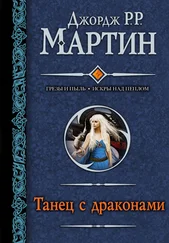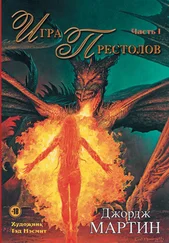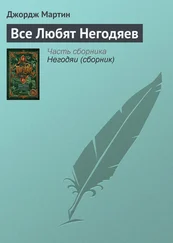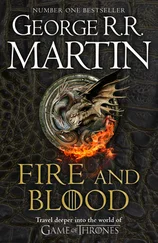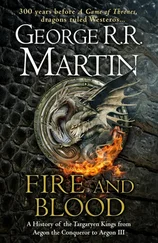Though Lysandro’s children could not inherit his offices, his palace went to his daughter Lysara, his ships to his son Drako, his pillow house to his son Fredo, his library to his daughter Marra. All of his offspring partook of the wealth represented by the Rogare Bank. Even his bastards received shares, albeit fewer than those alloted to his trueborn sons and daughters. Effective control of the bank, however, was vested in Lysandro’s eldest son, Lysaro…of whom it was truly written, “he had twice his father’s ambition and half his father’s ability.”
Lysaro Rogare aspired to rule Lys, but had neither the cunning nor the patience to spend decades in the slow accumulation of wealth and power, as his father Lysandro had. With rivals dying all around him, Lysaro first moved to secure his own person by buying one thousand Unsullied from the slavers of Astapor. These eunuch warriors were renowned as the finest foot soldiers in the world, and were moreover trained to absolute obedience, so their masters need never fear defiance or betrayal.
Once surrounded by these protectors, Lysaro secured his selection as gonfaloniere, winning the commons with lavish entertainments and the magisters with bribes larger than any of them had ever seen before. When these expenditures exhausted his personal fortune, he began to divert gold from the bank. His intent, as he later revealed, was to provoke a short, victorious war with Tyrosh or Myr. As gonfaloniere, the glory of conquest would accrue to him, enabling him to win the office of first magister. By sacking Tyrosh or Myr, he would gain sufficient gold to restore the funds he had taken from the bank and leave him the richest man in Lys.
It was a fool’s scheme, and it was quickly undone. Legend claims it was men in the hire of the Iron Bank of Braavos who first began suggesting that the Rogare Bank might be unsound, but regardless of who started it, such talk was soon heard all over Lys. The city’s magisters and merchant princes began to demand the return of their deposits; a few at first, then more and more, until a river of gold was pouring from Lysaro’s vaults…a river that soon enough ran dry. By that time Lysaro himself was gone. Faced with ruin, he fled Lys in the dead of night with three bed slaves, six servants, and a hundred of his Unsullied, abandoning his wife, his daughters, and his palace. Understandably alarmed, the city magisters moved at once to seize the Rogare Bank, only to discover that naught remained but a hollow shell.
The fall of House Rogare was swift and brutal. Lysaro’s brothers and sisters claimed to have played no part in the despoiling of the bank, but many doubted their claims of innocence. Drako Rogare escaped to Volantis on one of his galleys whilst his sister Marra fled to the temple of Yndros in man’s garb and there claimed sanctuary, but all their siblings were seized and put on trial, even the bastards. When Lysara Rogare protested, “I did not know,” Magister Tigaro Moraqos replied, “You should have,” and the mob roared its approval. Half the city had been ruined.
Nor was the damage confined to Lys. As word of the fall of the House of Rogare reached Westeros, lords and merchants alike soon realized the coin they had entrusted to the House of Rogare was lost. In Gulltown, Moredo Rogare moved swiftly, yielding up his command to Alyn Oakenfist and taking ship for Braavos. Lotho Rogare was arrested by Ser Lucas Leygood and his gold cloaks as he attempted to depart King’s Landing; all his letters and ledgers were seized, along with every scrap of gold and silver remaining in the vaults atop Visenya’s Hill. Meanwhile, Ser Marston Waters of the Kingsguard descended on the Mermaid with two of his Sworn Brothers and fifty guardsmen. The patrons of the brothel were driven into the street, many of them naked (Mushroom was amongst those so rousted, by his own admission), whilst Lord Roggerio was marched at spearpoint through a jeering crowd. At the Red Keep, the brothel keeper and the banker both were imprisoned in the Tower of the Hand; their kinship to Prince Viserys’s wife spared them the horrors of the black cells, for the nonce.
At first it was widely assumed that the Hand had ordered their arrest. With Ser Corwyn’s death in the Vale, only Lord Rowan and Grand Maester Munkun remained as regents. This misapprehension lasted only a few hours, for that very evening Lord Rowan himself joined the Rogares in captivity. Nor did the Fingers, the Hand’s supposed protectors, do aught to defend him. When Ser Mervyn Flowers entered the council chambers to take his lordship into custody, Tessario the Tiger ordered his men to stand aside. The only resistance was that offered by Lord Rowan’s squire, who was quickly overwhelmed. “Spare the boy,” Lord Thaddeus pleaded, and they did…but not until Flowers had cut off one of the lad’s ears, “to teach him not to bare steel to the Kingsguard.”
The list of those to be seized and held for trial as suspected traitors did not end there. Three of Lord Rowan’s cousins and one of his nephews were also arrested, along with twoscore grooms, servants, and knights retainer in his service. All were taken unawares and yielded meekly. But when Ser Amaury Peake approached Maegor’s Holdfast with a dozen men-at-arms, he found Viserys Targaryen himself upon the drawbridge, a battleaxe in hand. “It was a heavy axe, the prince a somewhat spindly boy of three-and-ten,” the fool Mushroom tells us. “One doubted that the lad could even lift that axe, much less wield it.”
“If you are come to take my lady wife, ser, turn and go,” the young prince said, “for you shall not pass whilst I still stand.”
Ser Amaury found his show of defiance more amusing than threatening. “Your lady is wanted for questioning in connection with the treason of her brothers,” he told the prince.
“And who is it who wants her?” the prince demanded.
“The Hand of the King,” Ser Amaury replied.
“Lord Rowan?” asked Viserys.
“Lord Rowan has been removed from office. Ser Marston Waters is the new King’s Hand.”
At that moment Aegon III himself stepped from the holdfast gate to stand beside his brother. “I am the king,” His Grace reminded them, “and I never chose Ser Marston for my Hand.”
Aegon’s intervention took Ser Amaury aback, Mushroom tells us, but after a moment’s hesitation he said, “Your Grace is still a boy. Until you come of age, Sire, your leal lords must make such choices for you. Ser Marston was chosen by your regents.”
“Lord Rowan is my regent,” the king insisted.
“No longer,” said Ser Amaury. “Lord Rowan betrayed your trust. His regency is at an end.”
“By whose authority?” demanded Aegon.
“The Hand of the King,” said the white knight.
Prince Viserys laughed at that (for King Aegon never laughed, to Mushroom’s dismay) and said, “The Hand names the regent and the regent names the Hand, and round and round and round we dance…but you shall not pass, ser, nor shall you touch my wife. Begone, or I promise you, every man of you shall die here.”
Then Ser Amaury Peake ran short of patience. He could not allow himself to be balked by two boys, one of fifteen and one of thirteen, the elder unarmed. “Enough,” he said and ordered his men to move the boys aside. “Be gentle with them, and see that they come to no harm at our hands.”
“This is on your head, ser,” Prince Viserys warned. He drove his axe deep into the wood of the drawbridge, scampered back, and said, “Go no farther than the axe, or you will die.” The king took him by the shoulder and drew him back into the safety of the holdfast, and a shadow stepped onto the drawbridge.
Sandoq the Shadow had come from Lys with Lady Larra, a gift from her father the Magister Lysandro. Black of skin and black of hair, he stood almost seven feet tall. His face, which he oft kept hidden behind a black silk veil, was a mass of thin white scars, and his lips and tongue had been removed, leaving him both mute and hideous to look upon. It was said of him that he had been the victor of a hundred fights in the death pits of Meereen, that he had once torn out the throat of a foe with his teeth after his sword had shattered, that he drank the blood of the men he killed, that in the pits he had slain lions, bears, wolves, and wyverns with no weapon but the stones he found upon the sands.
Читать дальше
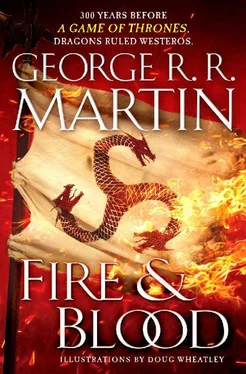
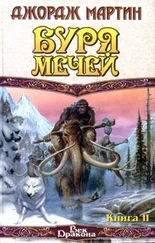
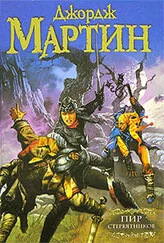

![Джордж Мартин - Сыны Дракона [лп]](/books/33039/dzhordzh-martin-syny-drakona-lp-thumb.webp)
